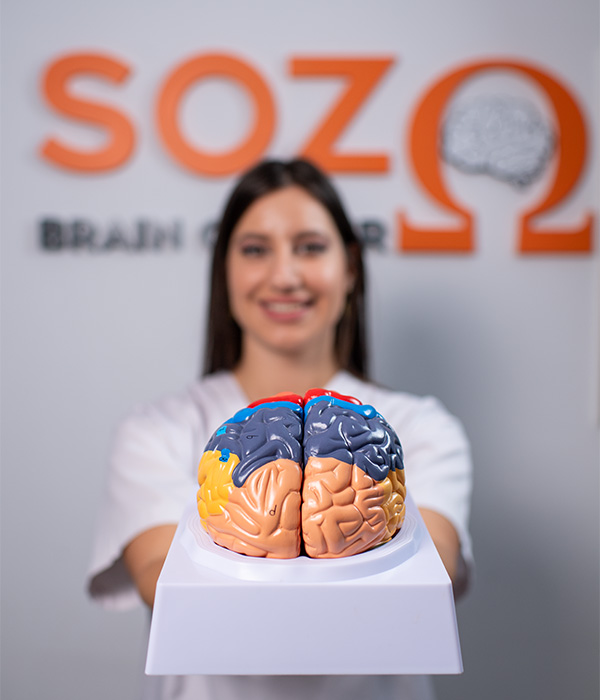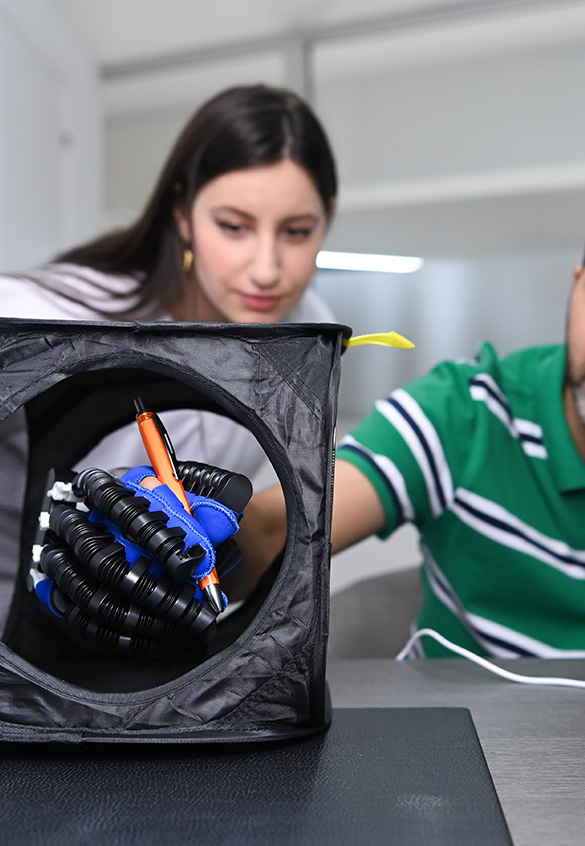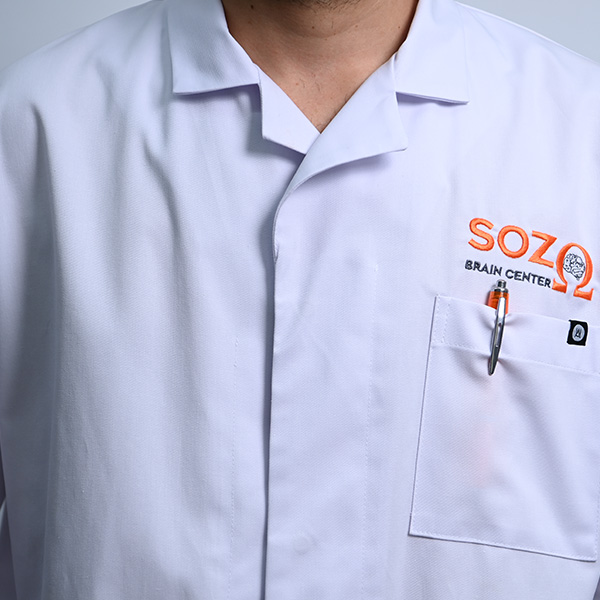Our aim is an individual approach in setting final and intermediate treatment goals, improving quality of life for our patients.

At SOZO Brain Center, we use a comprehensive approach to gather and analyze clinical information, which leads to better health outcomes. We don’t just focus on the main complaints of the patients, which are often limited to two or three issues. Instead, we dig deeper to uncover underlying conditions that may be affecting your overall health. By addressing these hidden conditions, we can significantly improve your well-being and help reduce the severity of your primary symptoms.
Transcranial Direct Current Stimulation (tDCS) is a non-invasive brain stimulation technique that uses a low electrical current to influence neuronal activity. It involves placing two electrodes—an anode (positive) and a cathode (negative)—on specific areas of the scalp. The anode increases neuron excitability, making them more likely to fire, while the cathode decreases excitability, reducing neuron activity. A gentle current (typically 1-2 mA) flows between the electrodes, altering the resting membrane potential of neurons in targeted brain regions. With repeated sessions, the effects of tDCS tend to build up, leading to longer-lasting benefits.
tDCS is being studied for its potential to treat various conditions and improve brain functions. It has shown promise in managing mood disorders like depression and anxiety by targeting the prefrontal cortex for emotional regulation. It is also explored for cognitive enhancement, helping with memory, attention, and learning by strengthening neural pathways. In rehabilitation, tDCS aids stroke recovery and motor impairments by stimulating motor and sensory regions. Additionally, it may alleviate chronic pain by targeting brain areas involved in pain perception, such as the motor cortex.
You can always contact our specialists and get clarifications on current issues at any stage of treatment.
Transcutaneous Auricular Vagus Nerve Stimulation (taVNS) is a non-invasive neuromodulation technique that delivers gentle electrical impulses to the auricular branch of the vagus nerve through the cymba concha region of the ear. By modulating vagal activity, taVNS helps restore balance between the sympathetic and parasympathetic nervous systems, supporting the body’s natural ability to regulate stress, inflammation, and mood. Research has shown that stimulating this pathway can positively affect conditions linked to dysregulated autonomic or neural function, including depression, anxiety, epilepsy, and migraine.
Research suggests taVNS holds promise for improving mood, reducing anxiety, and alleviating symptoms of depression by restoring vagal tone and regulating neurotransmitter systems. It has also been explored for enhancing cognitive performance, attention, and working memory by optimizing neural network connectivity. In clinical contexts, taVNS may assist with conditions such as tinnitus, migraine, and epilepsy through its stabilizing effects on neural excitability. Additionally, its influence on autonomic function supports cardiovascular health and stress resilience.
You can always reach out to our experts for any inquiries regarding your ongoing treatment if you have any questions.
Cranial Electrotherapy Stimulation (CES) is a non-invasive neuromodulation technique that delivers low-level electrical currents—typically less than 600 microamperes—via electrodes placed on the earlobes. These gentle pulses target the brain’s limbic system and hypothalamus, helping to regulate the brain’s electrochemical activity. CES is designed to stimulate alpha brainwave production, which is associated with a relaxed, calm mental state, while simultaneously reducing stress-related beta wave activity.
CES has been clinically studied for over 40 years and is supported by a robust body of scientific evidence demonstrating its effectiveness in managing conditions such as anxiety, depression, and insomnia. Patients often report improvements after just a few sessions, with benefits accumulating over time. Studies have shown that CES can significantly reduce symptoms of generalized anxiety disorder, enhance total sleep time, and improve emotional regulation without the side effects commonly associated with medication. It has been used successfully in clinical settings, primary care, and at-home treatment programs.
You can always contact our specialists and get clarifications on current issues at any stage of treatment.
Transcranial Pulse Stimulation (TPS) is an innovative, non-invasive therapy that is transforming the way Alzheimer’s disease is treated. By delivering low-energy shock waves to specific deep brain regions, TPS aims to enhance cognitive function and improve patients’ quality of life. This therapy is suitable for outpatient care, making it accessible and convenient for those seeking effective alternatives to traditional treatment. A key element of TPS is its integration with BodyTrack® software, which utilizes MRI data to accurately visualize treatment zones and monitor progress, ensuring precision and individualized care.
Beyond its effectiveness for Alzheimer’s disease, TPS shows promising potential in treating other neurological disorders such as Parkinson’s disease. Supported by clinical research and certified for safety, TPS stands out as a major advancement in neurological care. Its ability to deliver targeted treatment with minimal disruption to patients’ lives offers renewed optimism for those affected by challenging brain conditions.
You can always reach out to our experts for any inquiries regarding your ongoing treatment if you have any questions.
Microcurrent Electrical Therapy (MET) is a non-invasive technique that uses extremely low-level electrical currents, in the microampere range, to support the body’s healing processes. The technique is applied through small electrodes placed on or near the area of discomfort or injury. These gentle currents interact with the body’s own bioelectrical signals, helping to normalize cellular function, reduce pain, and promote tissue repair.
MET works by modulating peripheral pain pathways and supporting cellular activity, which can improve circulation, decrease inflammation, and accelerate recovery. Repeated sessions may lead to cumulative benefits, including longer-lasting pain relief, improved mobility, and enhanced overall tissue function.
This technique is used to address acute injuries, chronic pain, and post-traumatic conditions, offering a non-invasive approach that complements other therapies and supports the body’s ability to heal.
You can always contact our specialists and get clarifications on current issues at any stage of treatment.
A rehabilitation glove is a specialized device used in physical therapy to aid recovery of hand strength, dexterity, and range of motion after injuries, neurological issues, or surgeries. Equipped with sensors, motors, or actuators, the glove assists with hand and finger exercises, making it ideal for those with limited hand mobility.
Combining a rehabilitation glove with neuromodulation techniques, such as tDCS or CES, enhances recovery by stimulating neural pathways and promoting neuroplasticity. Neuromodulation primes motor-related brain areas, creating a more responsive environment for the glove to guide hand movements, improving motor function and control. This synergy supports patients in re-establishing muscle activation and coordination, especially after stroke, traumatic brain injury, or in conditions like cerebral palsy and multiple sclerosis.
For those with chronic pain, neuromodulation can reduce discomfort, making it easier to use the glove and improve participation. This integrated approach accelerates recovery, enhances motor learning, and can improve the quality of life for patients with various neurological and musculoskeletal conditions.

You can always reach out to our experts for any inquiries regarding your ongoing treatment if you have any questions.
Are you a medical professional? SOZO Brain Center presents doctors and clinicians globally with the chance to explore our neuromodulation technologies, review clinical studies, assess patient outcomes, interact with our diverse scientific team, and participate in training seminars focused on our treatment methods and evaluation techniques.
Additionally, we provide doctors with an opportunity to enhance the quality of care in their own practice through our distinctive Partnership Program. Discover more about these technologies.

Book a consultation today to learn more about how neuromodulation therapy can help.